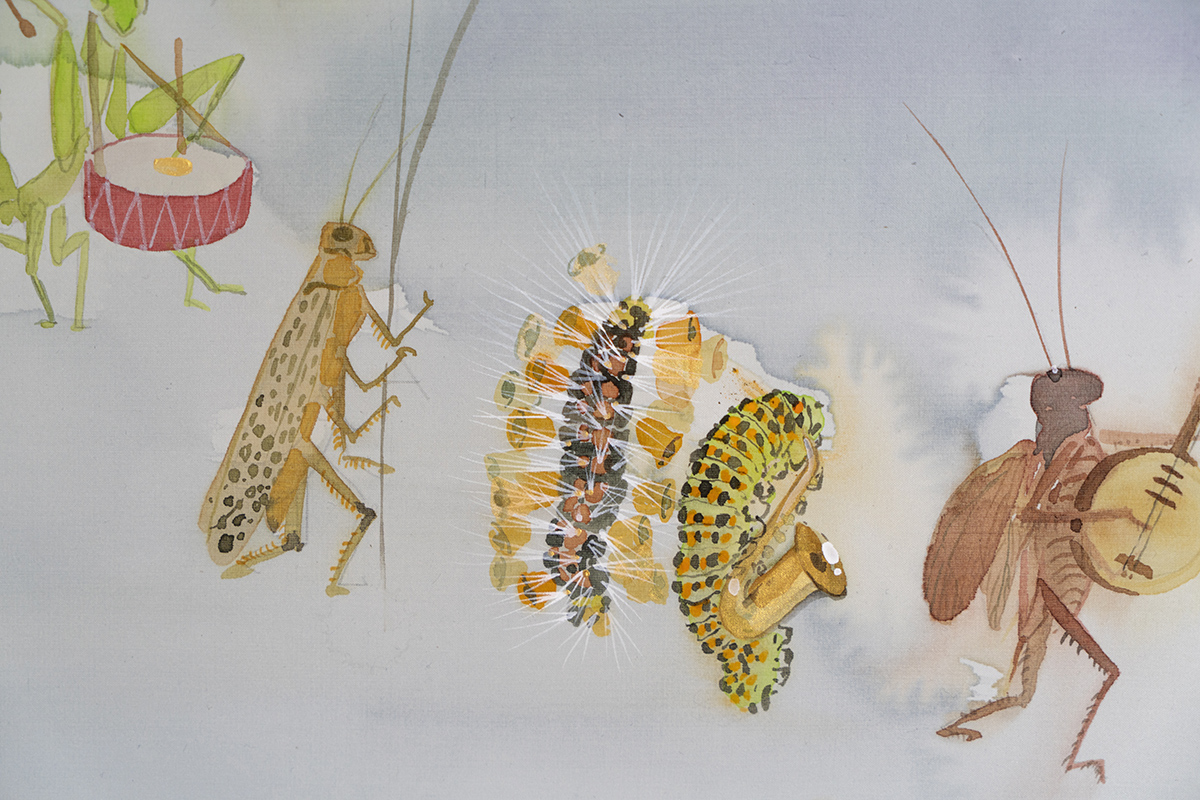
Stretching around 4,350km from the Tibetan Plateau to its delta in Southern Vietnam, and running through China, Myanmar, Laos, Thailand, Cambodia and Vietnam, the Mekong River has the world’s second highest aquatically biodiverse system (after the Amazon). In Vietnam, the river, known as Song Cuu Long (Nine Dragon River), provides an abundance of freshwater for the country’s fisheries and aquaculture, one of its biggest industries alongside rice agriculture, while the nutrient-rich silt carried down through the myriad waterways fosters the fertile landscape.
It’s from this river, often described as the lifeblood of the region, that Ho Chi Minh City-based artist Thao Nguyen Phan’s latest (and ongoing) project, Becoming Alluvium (2019–), springs. Comprising a 16-minute video, from which this exhibition borrows its title, a series of lacquer-works and silk paintings (Perpetual Brightness, 2019) and Phan’s most recent lacquerwork, Delta (2020), the project plays with fact and fiction in order to question the sources from which we receive our information, against the backdrop of human and ecological threats facing the river – the latter described by Phan, in an accompanying monograph, Monsoon Melody (2019), as ‘the river of Buddhism’, for its regional connections to Tibetan, Theravada and Mahayana Buddhism.
The single-channel video Becoming Alluvium (2019) plays out in three rounds of reincarnation, told through footage of the river and its verdant banks, archival illustrations and prints, and animated ink paintings. The story starts with two brothers who drown – the elder reincarnates into the Irrawaddy Dolphin, the younger into a water hyacinth. In subsequent reincarnations they return as a writer, a ferryman, a rat and finally a princess, who upon becoming aware of her vanity and greed, evaporates into the river.
Perpetual Brightness is an installation of six dark-green lacquered frames (made in collaboration with artist Truong Cong Tung, using plant- and soil-based materials) stacked in rows of three. The back of the frames together depict the Mekong river branching into its estuary at the delta in silver leaf, while the front serves as a support for the latest instalment of Phan’s brightly coloured watercolour paintings on silk. A procession of insects carry instruments; a group of spritelike young people shower mangrove roots with water using irrigation equipment; and crops grow from the bodies of naked figures before a looming dam. The lower panels form a triptych depicting a dead Irrawaddy Dolphin (a species that the industrialisation of the waterway has now rendered critically endangered), its head held in the arms of a boy in mourning while a halo of small children pour wine onto its carcass.
Drawing both video and painted narratives from a combination of local folklore, Buddhist customs, the 2018 collapse of Laos Saddle Dam D and the ensuing flood that killed many and displaced thousands, as well as the literature of Marguerite Duras and Italo Calvino, to tell the story of the river’s continued generational destruction, Phan paints an evocative and visually beautiful if depressing picture: it’s not hard to make the connection between the rapidly growing hydroelectricity industry and the slow strangling of the Mekong. The question is, when lessons are never learned, at what point is there nothing left to reincarnate?
Thao Nguyen Phan: Becoming Alluvium at Chisenhale Gallery, London, until 13 December